Ga offline met de app Player FM !
138 Rubén Abruña: keeping our poop in the loop
Manage episode 433527354 series 2592657
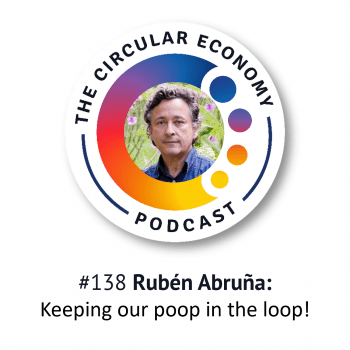
Award-winning documentary film maker Rubén Abruña helps us dig into one of the oldest problems in civil society…
All around the world, there are serious problems caused by the various ways we deal with our toilet waste – all the poop and pee we humans create every day. We waste drinking water – Flushing toilets use massive amounts of water – for example, in a country like Switzerland, each person will flush over 40 litres a day down the toilet. Often, the sewage from water toilets is mixed with household waste water, so it’s now contaminated with microplastics, cleaning chemicals, contraceptives and drug residues. And then, in most western societies, all that liquid waste is then mixed with industrial waste. So now we’ve got massive volumes of pretty toxic stuff to try and clean up, and separate into drinkable water and solid waste.
In developing countries, millions of people still use open toilets, or have to defecate on the land around their houses. So here, there are massive issues with disease and vermin, and in some areas, even a safety risk from predatory animals.
What’s more, we’re wasting precious resources, too. Our human pee and poop contains valuable nutrients, including significant quantities of nitrogen, phosphorus and potassium – NPK – the key elements that we need to growing food and other crops. Instead, we’re using expensive fossil fuels and synthetic chemicals to provide these macronutrients.
Back in his homeland of Puerto Rico over 20 years ago, Rubén Abruña experienced a sanitation epiphany when he sat on a dry toilet for the first time. He was amazed that he could poop using no water, leaving no stink, and that the deposit could be safely composted into fertilizer, without polluting the environment. It drove him nuts that more people were not doing the same, and this prompted him to make the award-winning film “Holy Shit: Can Poop Save the World?”
Rubén has over 30 years of experience in the film, television, and radio industries. He has written, produced, directed, and edited numerous documentaries, broadcast journalism stories, and educational programs in New York, San Juan, Miami, and Zürich.
International speaker, author and strategic advisor, Catherine Weetman helps people discover why circular, regenerative and fair solutions are better for people, planet – and prosperity.
Catherine’s award-winning book: A Circular Economy Handbook: How to Build a More Resilient, Competitive and Sustainable Business includes lots of practical examples and tips on getting started.
Stay in touch for free insights and updates…
Read on for more on our guest and links to the people, organisations and other resources we mention.
Don’t forget, you can subscribe to the podcast series on iTunes, Google Podcasts, PlayerFM, Spotify, TuneIn, or search for “circular economy” in your favourite podcast app. Stay in touch to get free insights and updates, direct to your inbox…
You can also use our interactive, searchable podcast index to find episodes by sector, by region or by circular strategy. Plus, there is now a regular Circular Economy Podcast newsletter, so you get the latest episode show notes and links delivered to your inbox on Sunday morning, each fortnight. The newsletter includes a link to the episode page on our website, with an audio player. You can subscribe by clicking this link to update your preferences.
Links we mention in the episode:
Catherine’s work:
- Circular Economy Podcast on LinkedIn: linkedin.com/showcase/circular-economy-podcast/
- Circular Economy Podcast website: circulareconomypodcast.com
- Catherine Weetman on LinkedIn: https://www.linkedin.com/in/catherine-weetman-9419107/
- A Circular Economy Handbook: How to Build a More Resilient, Competitive and Sustainable Business – buy from any good bookseller, or direct from the publisher Kogan Page, which ships worldwide (free shipping to UK and US) https://www.koganpage.com/CircEcon2
- Interactive podcast index https://www.rethinkglobal.info/circular-economy-podcast-index/
- Rethink Global www.rethinkglobal.info
- Sign up to get the podcast player and shownotes for each new episode emailed to your inbox
Links for Holy Shit, the movie:
- To stream the English version via Vimeo: https://vimeo.com/ondemand/holyshit2
- Impact Campaign Trailer: https://holyshit.global/impact-trailer/
- Film website in English, Spanish and German: HolyShit.Global
- Facebook: com/holyshitfilm/
- Instagram: com/holy_shit_film/
Links for Rubén Abruña
- LinkedIn: https://www.linkedin.com/in/rub%C3%A9n-abru%C3%B1a-filmmaker/
- Ruben’s previous film, The Absent House theabsenthouse.com and Official 3-minute trailer
Books, people and organisations we mentioned
- Hamish Skermer one of the film’s protagonists and pioneer of using composting toilets in open air music festivals across Europe. https://naturalevent.com/ His Ted Talk is a show stopper: https://youtu.be/gvnwuKDsCNo?si=8b2v41W3GsPYhBPi
- Bastian Etter is the scientist and founding director behind Vuna. He was an early contributor despite not being in the film. https://vuna.ch/en/
- Florian Augustin is the managing founder of Finizio https://finizio.de/ . His practical, scientific knowledge coupled with a sense of global wholesomeness and integrity make him a key person to spread the poop word
- Dr. Ariane Krause (second from left in the first photo) https://igzev.de/en/latest/news/detail/1290 is one of the directors of Zirkulierbar: the educational/marketing arm of the Leibniz Institute for Vegetable and Ornamental Crops: https://igzev.de/en/home They work together with Finizio in spreading the good word on recycling human excreta as fertilizer to grow food and plants. She has been a key player in making the German public aware of the film Holy Shit.
- The Humanure Handbook https://humanurehandbook.com/ The site has many of Joe Jenkin’s videos plus links to the book.
Guest bio
Rubén Abruña experienced a sanitation epiphany when he sat on a dry toilet for the first time 22 years ago in his homeland Puerto Rico. He was amazed that he could poop using no water, leaving no stink, and composting the deposit into fertilizer, without polluting the environment. It drove him nuts that more people were not doing the same, and this prompted him to make the award-winning film “Holy Shit: Can Poop Save the World?”
His previous film “The Absent House” had brought him close to the topic because it deals with a sustainable house that is off the grid and with three compost toilets. The film has screened in over a dozen film festivals across four continents and is distributed by Icarus Films.
Holy Shit won the audience award, and the best documentary in the category of Human and Nature at the Darsser NaturFilm Festival in October 2023. In May 2024, it was granted the “Film of the Future” award by the Ökofilmtour in Brandenburg, Germany. The documentary ran in over 50 theatres in Germany and Austria from November 2023 to mid-March 2024.
“Holy Shit: Can Poop Save the World?” has been nominated in several festivals in Europe, such as the Naturvision Film Festival in Ludwigsburg, Human Rights Berlin, Nature Film Festival Innsbruck, Film für die Erde (Films for the Earth) in Switzerland, Silbersalz in Halle (Saale), and at the German pavilion of the architecture biennale in Venice.
Rubén has over 30 years of experience in the film, television, and radio industries. He has written, produced, directed, and edited numerous documentaries, broadcast journalism stories, and educational programs in New York, San Juan, Miami, and Zürich.
Playlist: getting started with the circular economy…
Want to know more about the what the circular economy really is, and how it can help your business? Here’s a playlist to help you get to grips with the concept, how it creates value, and the common myths (spoiler alert – it’s much more than recycling!)
- #1 What is the circular economy: A quick intro to explain what the circular economy is and why it’s important. We explore how it helps create better products and services, and at the same time helps to make a better world. I break it down into my 5 circular economy components, helping you think about each part of your business.
- #2 The linear economy and your risk checklist: We dig a bit deeper into the way we do business now, the linear economy, and why that’s creating problems for business, society and our living planet. Also, we’ll look at the risks that emerge from those big-picture issues, and how they might affect your organisation.
- #90 Does circular mean it’s sustainable? Catherine Weetman is worried that companies are using circular economy solutions to grow their business (and their footprints).
- #101 Circular is better for people, planet and profit! How three simple strategies can help you get started with circular and regenerative solutions that are better for people, planet and profit.
- #120 Priorities are changing: people find life is better when we care for and share things – circular economy strategies make that better for business, too.
And here’s Catherine’s guide: What is the circular economy?
Want to dig deeper?
Why not buy Catherine’s award-winning book, A Circular Economy Handbook: How to Build a More Resilient, Competitive and Sustainable Business. This comprehensive guide uses a bottom-up, practical approach, and includes hundreds of real examples from around the world, to help you really ‘get’ the circular economy. Even better, you’ll be inspired with ideas to make your own business more competitive, resilient and sustainable.
Please let us know what you think of the podcast – and we’d love it if you could leave us a review on iTunes, or wherever you find your podcasts. Or send us an email…
Please let us know what you think of the podcast – and we’d love it if you could leave us a review on iTunes, or wherever you find your podcasts. Or send us an email…
Podcast music
Thanks to Belinda O’Hooley and Heidi Tidow, otherwise known as the brilliant, inventive and generous folk duo, O’Hooley & Tidow for allowing me to use the instrumentals from the live version of Summat’s Brewin’ as music for the podcast. You can find the whole track (inspired by the Copper Family song “Oh Good Ale”) on their album, also called Summat’s Brewin’. Or, follow them on Twitter.
Previous episodes….
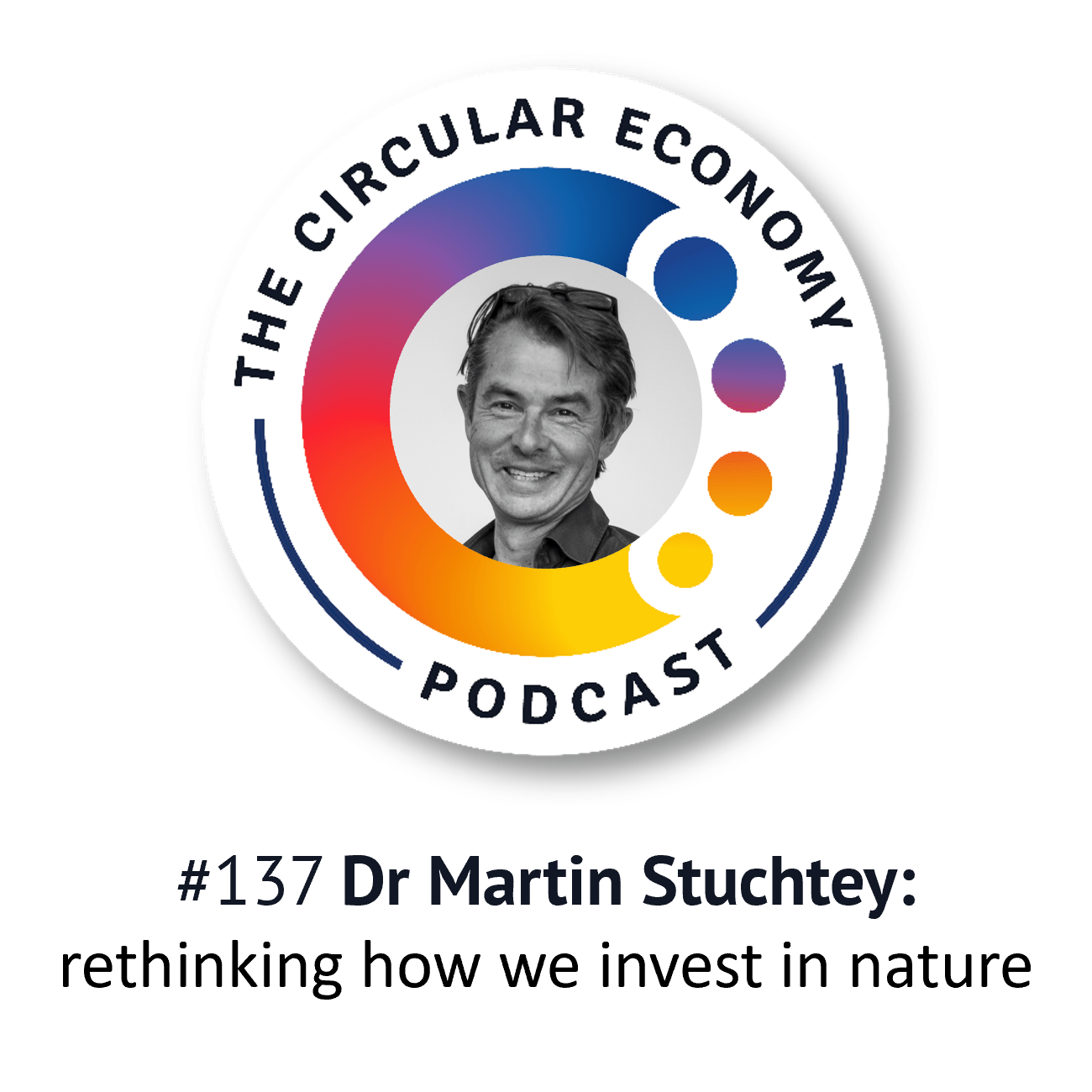
137 Dr Martin Stuchtey: rethinking how we invest in nature
28th July 2024
agriculture
regeneration
systems thinking
Prof. Dr. Martin Stuchtey – a geologist, economist and entrepreneur – is challenging and helping to rethink industrial, farming and economic systems. He founded The Landbanking Group, a Nature Fintech aiming to bring natural capital onto our balance sheets in service of the Paris and Montreal agreements. Dr. Martin Stuchtey is a former Senior and Managing Partner at McKinsey &…
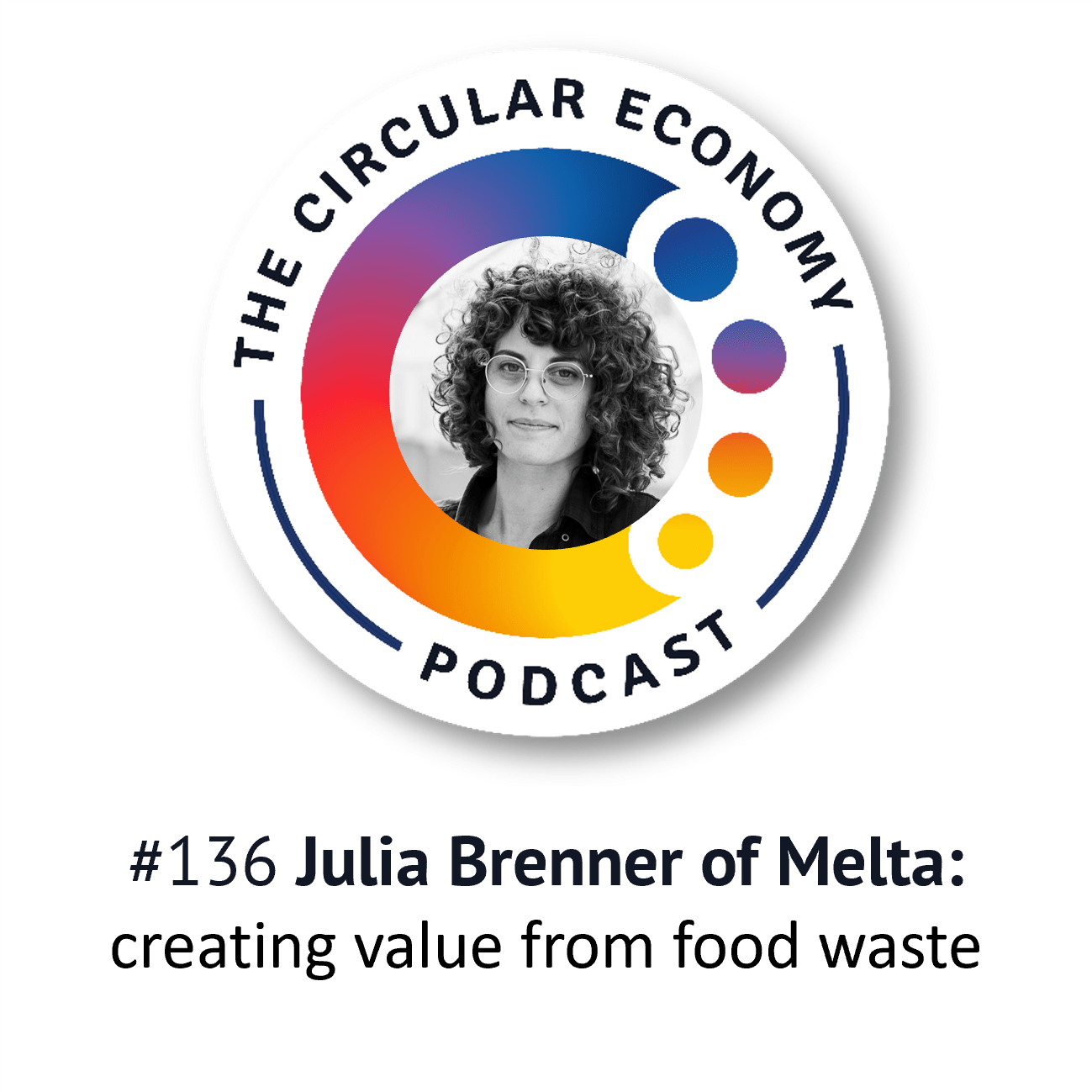
136 Julia Brenner of Melta: creating value from food waste
14th July 2024
Circular economy
food
recycling
regenerative
social value
There is a simple solution to conserve, and reuse, more of the nutrients from food waste. In today’s episode, I’m talking to Julia Brenner, a soil scientist and co-founder of Melta, a company dedicated to transforming waste management and soil health. Julia and her business partner founded Melta in 2020, to solve two interconnected challenges faced by rural municipalities: the…
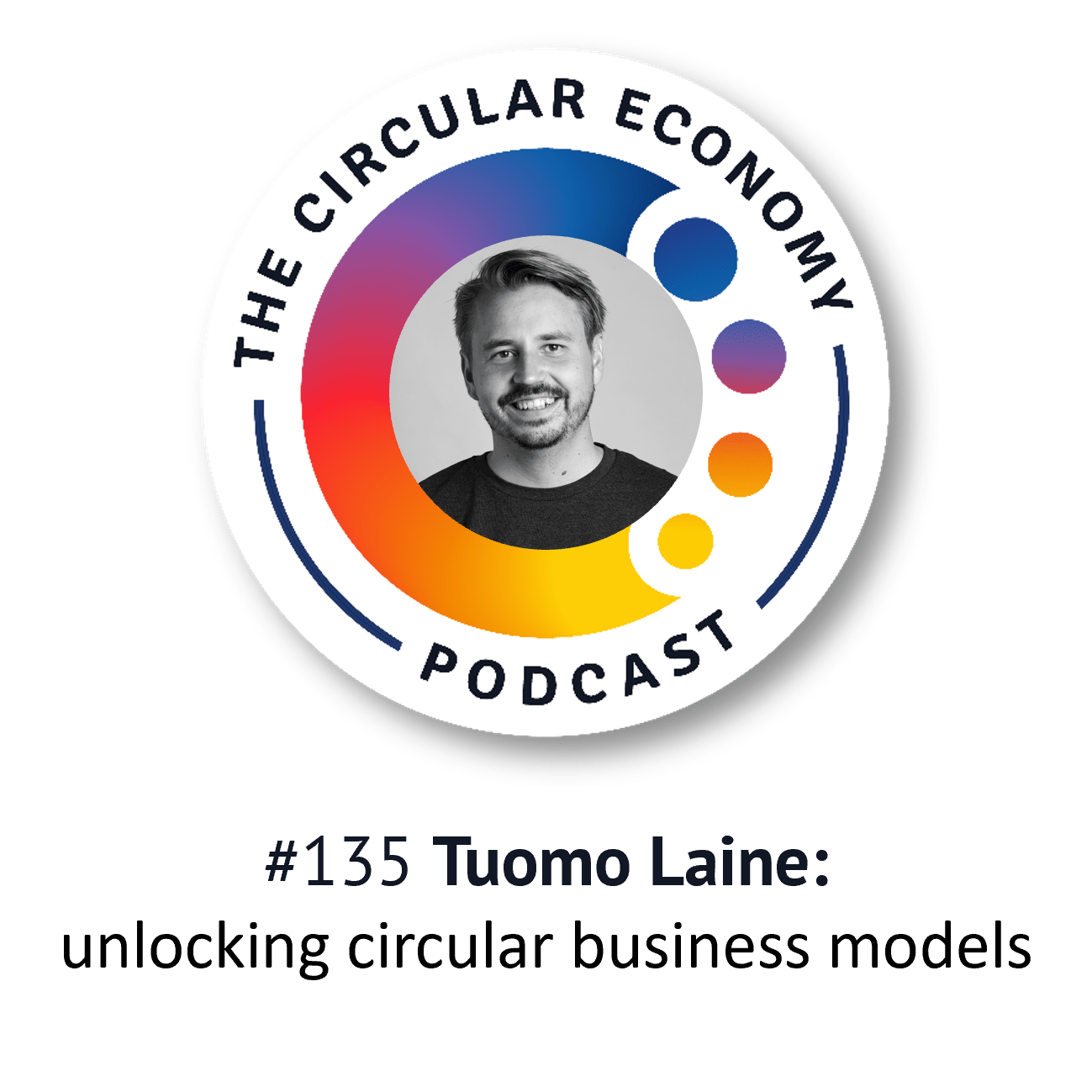
135 Tuomo Laine: unlocking circular business models
30th June 2024
business models
Circular economy
enablers
rental
resell
sharing
software
technology
Tuomo Laine is the CEO and co-founder of Twice Commerce, which provides software to help its clients unlock a range of circular business models. Tuomo is known for being straightforward and action-oriented, and for his dedication to using entrepreneurship for societal good. He is a member of the Unreasonable Group Fellowship, and is occasionally invited to lecture at Aalto University,…

134 Jane Martin of City to Sea: powering refill & reuse on-the-go
16th June 2024
Circular economy
food
Packaging
plastic
refills
reuse
To mark World Refill Day 2024, we talk to Jane Martin, the CEO of City to Sea, a campaigning non-profit with a mission to prevent plastic pollution at source. World Refill Day is a global campaign to prevent plastic pollution and help people live with less waste. It’s a day of action each year, designed to create an alternative vision…
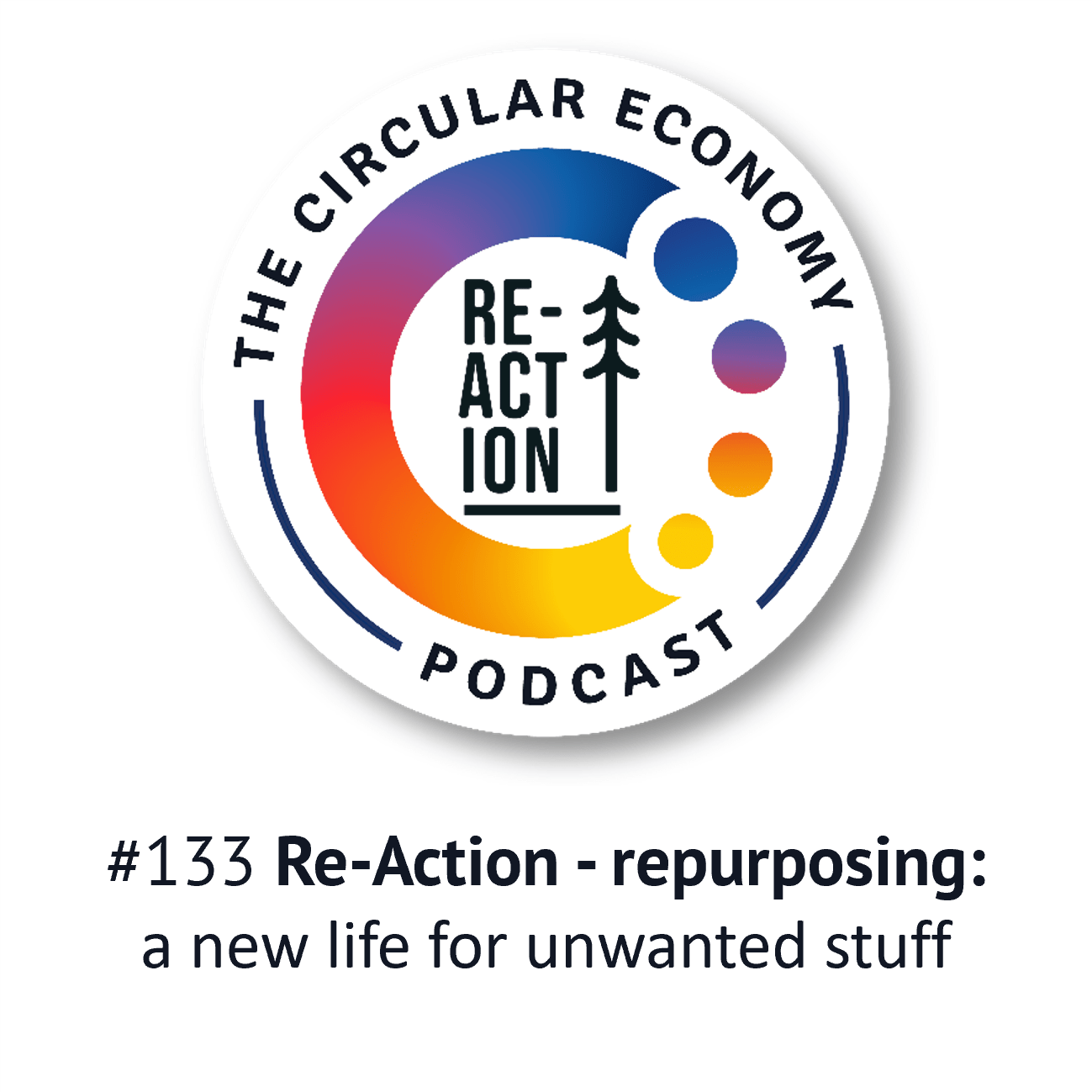
133 Re-Action – repurposing: a new life for unwanted stuff
9th June 2024
Circular economy
design
materials
repurpose
social value
This is the 4th and final episode in the special 5th Anniversary mini-series featuring the Re-Action Collective, and we’re focusing on repurposing – using creativity and craft skills to breathe new life into unwanted outdoor gear, clothing and workwear. We’ll hear from the founders of two small repurposing businesses: First, Jen Dickinson, founder of Dirtbags Climbing, an upcycling workshop in…
146 afleveringen
Manage episode 433527354 series 2592657

Award-winning documentary film maker Rubén Abruña helps us dig into one of the oldest problems in civil society…
All around the world, there are serious problems caused by the various ways we deal with our toilet waste – all the poop and pee we humans create every day. We waste drinking water – Flushing toilets use massive amounts of water – for example, in a country like Switzerland, each person will flush over 40 litres a day down the toilet. Often, the sewage from water toilets is mixed with household waste water, so it’s now contaminated with microplastics, cleaning chemicals, contraceptives and drug residues. And then, in most western societies, all that liquid waste is then mixed with industrial waste. So now we’ve got massive volumes of pretty toxic stuff to try and clean up, and separate into drinkable water and solid waste.
In developing countries, millions of people still use open toilets, or have to defecate on the land around their houses. So here, there are massive issues with disease and vermin, and in some areas, even a safety risk from predatory animals.
What’s more, we’re wasting precious resources, too. Our human pee and poop contains valuable nutrients, including significant quantities of nitrogen, phosphorus and potassium – NPK – the key elements that we need to growing food and other crops. Instead, we’re using expensive fossil fuels and synthetic chemicals to provide these macronutrients.
Back in his homeland of Puerto Rico over 20 years ago, Rubén Abruña experienced a sanitation epiphany when he sat on a dry toilet for the first time. He was amazed that he could poop using no water, leaving no stink, and that the deposit could be safely composted into fertilizer, without polluting the environment. It drove him nuts that more people were not doing the same, and this prompted him to make the award-winning film “Holy Shit: Can Poop Save the World?”
Rubén has over 30 years of experience in the film, television, and radio industries. He has written, produced, directed, and edited numerous documentaries, broadcast journalism stories, and educational programs in New York, San Juan, Miami, and Zürich.
International speaker, author and strategic advisor, Catherine Weetman helps people discover why circular, regenerative and fair solutions are better for people, planet – and prosperity.
Catherine’s award-winning book: A Circular Economy Handbook: How to Build a More Resilient, Competitive and Sustainable Business includes lots of practical examples and tips on getting started.
Stay in touch for free insights and updates…
Read on for more on our guest and links to the people, organisations and other resources we mention.
Don’t forget, you can subscribe to the podcast series on iTunes, Google Podcasts, PlayerFM, Spotify, TuneIn, or search for “circular economy” in your favourite podcast app. Stay in touch to get free insights and updates, direct to your inbox…
You can also use our interactive, searchable podcast index to find episodes by sector, by region or by circular strategy. Plus, there is now a regular Circular Economy Podcast newsletter, so you get the latest episode show notes and links delivered to your inbox on Sunday morning, each fortnight. The newsletter includes a link to the episode page on our website, with an audio player. You can subscribe by clicking this link to update your preferences.
Links we mention in the episode:
Catherine’s work:
- Circular Economy Podcast on LinkedIn: linkedin.com/showcase/circular-economy-podcast/
- Circular Economy Podcast website: circulareconomypodcast.com
- Catherine Weetman on LinkedIn: https://www.linkedin.com/in/catherine-weetman-9419107/
- A Circular Economy Handbook: How to Build a More Resilient, Competitive and Sustainable Business – buy from any good bookseller, or direct from the publisher Kogan Page, which ships worldwide (free shipping to UK and US) https://www.koganpage.com/CircEcon2
- Interactive podcast index https://www.rethinkglobal.info/circular-economy-podcast-index/
- Rethink Global www.rethinkglobal.info
- Sign up to get the podcast player and shownotes for each new episode emailed to your inbox
Links for Holy Shit, the movie:
- To stream the English version via Vimeo: https://vimeo.com/ondemand/holyshit2
- Impact Campaign Trailer: https://holyshit.global/impact-trailer/
- Film website in English, Spanish and German: HolyShit.Global
- Facebook: com/holyshitfilm/
- Instagram: com/holy_shit_film/
Links for Rubén Abruña
- LinkedIn: https://www.linkedin.com/in/rub%C3%A9n-abru%C3%B1a-filmmaker/
- Ruben’s previous film, The Absent House theabsenthouse.com and Official 3-minute trailer
Books, people and organisations we mentioned
- Hamish Skermer one of the film’s protagonists and pioneer of using composting toilets in open air music festivals across Europe. https://naturalevent.com/ His Ted Talk is a show stopper: https://youtu.be/gvnwuKDsCNo?si=8b2v41W3GsPYhBPi
- Bastian Etter is the scientist and founding director behind Vuna. He was an early contributor despite not being in the film. https://vuna.ch/en/
- Florian Augustin is the managing founder of Finizio https://finizio.de/ . His practical, scientific knowledge coupled with a sense of global wholesomeness and integrity make him a key person to spread the poop word
- Dr. Ariane Krause (second from left in the first photo) https://igzev.de/en/latest/news/detail/1290 is one of the directors of Zirkulierbar: the educational/marketing arm of the Leibniz Institute for Vegetable and Ornamental Crops: https://igzev.de/en/home They work together with Finizio in spreading the good word on recycling human excreta as fertilizer to grow food and plants. She has been a key player in making the German public aware of the film Holy Shit.
- The Humanure Handbook https://humanurehandbook.com/ The site has many of Joe Jenkin’s videos plus links to the book.
Guest bio
Rubén Abruña experienced a sanitation epiphany when he sat on a dry toilet for the first time 22 years ago in his homeland Puerto Rico. He was amazed that he could poop using no water, leaving no stink, and composting the deposit into fertilizer, without polluting the environment. It drove him nuts that more people were not doing the same, and this prompted him to make the award-winning film “Holy Shit: Can Poop Save the World?”
His previous film “The Absent House” had brought him close to the topic because it deals with a sustainable house that is off the grid and with three compost toilets. The film has screened in over a dozen film festivals across four continents and is distributed by Icarus Films.
Holy Shit won the audience award, and the best documentary in the category of Human and Nature at the Darsser NaturFilm Festival in October 2023. In May 2024, it was granted the “Film of the Future” award by the Ökofilmtour in Brandenburg, Germany. The documentary ran in over 50 theatres in Germany and Austria from November 2023 to mid-March 2024.
“Holy Shit: Can Poop Save the World?” has been nominated in several festivals in Europe, such as the Naturvision Film Festival in Ludwigsburg, Human Rights Berlin, Nature Film Festival Innsbruck, Film für die Erde (Films for the Earth) in Switzerland, Silbersalz in Halle (Saale), and at the German pavilion of the architecture biennale in Venice.
Rubén has over 30 years of experience in the film, television, and radio industries. He has written, produced, directed, and edited numerous documentaries, broadcast journalism stories, and educational programs in New York, San Juan, Miami, and Zürich.
Playlist: getting started with the circular economy…
Want to know more about the what the circular economy really is, and how it can help your business? Here’s a playlist to help you get to grips with the concept, how it creates value, and the common myths (spoiler alert – it’s much more than recycling!)
- #1 What is the circular economy: A quick intro to explain what the circular economy is and why it’s important. We explore how it helps create better products and services, and at the same time helps to make a better world. I break it down into my 5 circular economy components, helping you think about each part of your business.
- #2 The linear economy and your risk checklist: We dig a bit deeper into the way we do business now, the linear economy, and why that’s creating problems for business, society and our living planet. Also, we’ll look at the risks that emerge from those big-picture issues, and how they might affect your organisation.
- #90 Does circular mean it’s sustainable? Catherine Weetman is worried that companies are using circular economy solutions to grow their business (and their footprints).
- #101 Circular is better for people, planet and profit! How three simple strategies can help you get started with circular and regenerative solutions that are better for people, planet and profit.
- #120 Priorities are changing: people find life is better when we care for and share things – circular economy strategies make that better for business, too.
And here’s Catherine’s guide: What is the circular economy?
Want to dig deeper?
Why not buy Catherine’s award-winning book, A Circular Economy Handbook: How to Build a More Resilient, Competitive and Sustainable Business. This comprehensive guide uses a bottom-up, practical approach, and includes hundreds of real examples from around the world, to help you really ‘get’ the circular economy. Even better, you’ll be inspired with ideas to make your own business more competitive, resilient and sustainable.
Please let us know what you think of the podcast – and we’d love it if you could leave us a review on iTunes, or wherever you find your podcasts. Or send us an email…
Please let us know what you think of the podcast – and we’d love it if you could leave us a review on iTunes, or wherever you find your podcasts. Or send us an email…
Podcast music
Thanks to Belinda O’Hooley and Heidi Tidow, otherwise known as the brilliant, inventive and generous folk duo, O’Hooley & Tidow for allowing me to use the instrumentals from the live version of Summat’s Brewin’ as music for the podcast. You can find the whole track (inspired by the Copper Family song “Oh Good Ale”) on their album, also called Summat’s Brewin’. Or, follow them on Twitter.
Previous episodes….

137 Dr Martin Stuchtey: rethinking how we invest in nature
28th July 2024
agriculture
regeneration
systems thinking
Prof. Dr. Martin Stuchtey – a geologist, economist and entrepreneur – is challenging and helping to rethink industrial, farming and economic systems. He founded The Landbanking Group, a Nature Fintech aiming to bring natural capital onto our balance sheets in service of the Paris and Montreal agreements. Dr. Martin Stuchtey is a former Senior and Managing Partner at McKinsey &…

136 Julia Brenner of Melta: creating value from food waste
14th July 2024
Circular economy
food
recycling
regenerative
social value
There is a simple solution to conserve, and reuse, more of the nutrients from food waste. In today’s episode, I’m talking to Julia Brenner, a soil scientist and co-founder of Melta, a company dedicated to transforming waste management and soil health. Julia and her business partner founded Melta in 2020, to solve two interconnected challenges faced by rural municipalities: the…

135 Tuomo Laine: unlocking circular business models
30th June 2024
business models
Circular economy
enablers
rental
resell
sharing
software
technology
Tuomo Laine is the CEO and co-founder of Twice Commerce, which provides software to help its clients unlock a range of circular business models. Tuomo is known for being straightforward and action-oriented, and for his dedication to using entrepreneurship for societal good. He is a member of the Unreasonable Group Fellowship, and is occasionally invited to lecture at Aalto University,…

134 Jane Martin of City to Sea: powering refill & reuse on-the-go
16th June 2024
Circular economy
food
Packaging
plastic
refills
reuse
To mark World Refill Day 2024, we talk to Jane Martin, the CEO of City to Sea, a campaigning non-profit with a mission to prevent plastic pollution at source. World Refill Day is a global campaign to prevent plastic pollution and help people live with less waste. It’s a day of action each year, designed to create an alternative vision…

133 Re-Action – repurposing: a new life for unwanted stuff
9th June 2024
Circular economy
design
materials
repurpose
social value
This is the 4th and final episode in the special 5th Anniversary mini-series featuring the Re-Action Collective, and we’re focusing on repurposing – using creativity and craft skills to breathe new life into unwanted outdoor gear, clothing and workwear. We’ll hear from the founders of two small repurposing businesses: First, Jen Dickinson, founder of Dirtbags Climbing, an upcycling workshop in…
146 afleveringen
Tutti gli episodi
×Welkom op Player FM!
Player FM scant het web op podcasts van hoge kwaliteit waarvan u nu kunt genieten. Het is de beste podcast-app en werkt op Android, iPhone en internet. Aanmelden om abonnementen op verschillende apparaten te synchroniseren.




